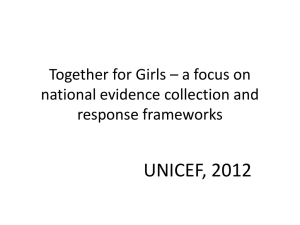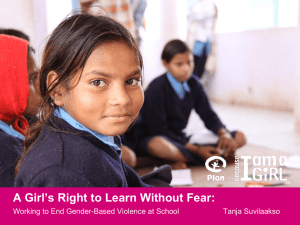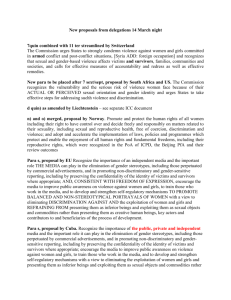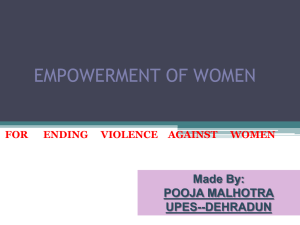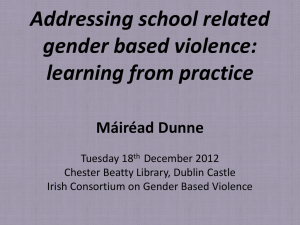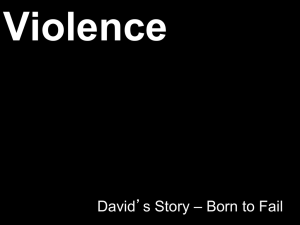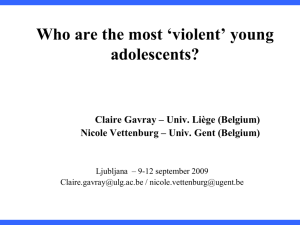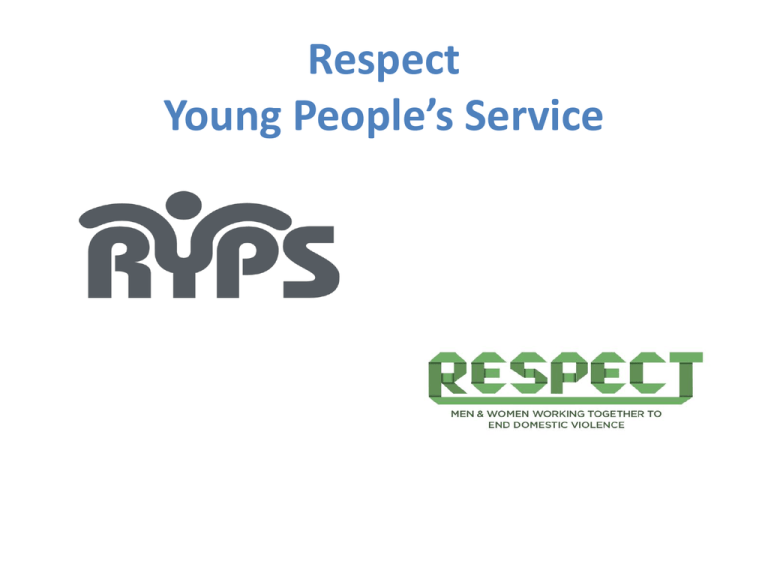
Respect
Young People’s Service
What we do…
Our vision is to end violence and abuse in
close relationships.
Young People’s Services
•
•
•
•
•
National Practitioner’s Seminars
Offer training and awareness sessions
Toolkit 13- 18 yrs – IPV & APV – since 2009
RYPP – 11-14 yrs – primarily APV – since 2013
Provided the support service for the this is abuse
campaign 2014
NSPCC 2009
(Barter)
• Surveyed 1,353 UK teenagers (of which 88% had had an
intimate relationship) plus interviews with 91 young people
• 25% of girls and 18% boys reported experiencing physical IPV
• 76% of those girls stated had a negative impact on their
welfare - only so for 14% of the boys
• 31% of the girls and 16% of the boys had experienced sexual
partner violence
• 70% of those girls reported a negative impact on their welfare
of sexual abuse compared to 13% of those boys.
NSPCC 2009 (Barter)
Highest Associated Factor was Age Difference
• Physical violence was - 14% same age, 23% slightly older and
70% much older (> 2yrs)
• Sexual violence - 75% of all reported incidents occurred in the
‘much older’ group and 80% of girls with a much older
partner reported sexual violence
Same Sex Relationships
• 24% of males & 28% of females reported physical
violence.(Halpern, Young, Waller et al. 2004
• Very similar levels to those in heterosexual relationships
(Hester – 2008)
• But in the NSPCC study (4% same sex partner) (Barter 2009) 44% of the young people surveyed had experienced physical
violence in a same sex relationship compared to only 23% in
opposite sex relationships.
Dating Violence - Outcomes
Rosen 2004
• Six times more likely to become pregnant in their
teens
• 70% teenage mothers experienced dv from a partner
Domestic violence and family dynamics
♂
♂
♀
♂
♀
♀
♀
♀
• APV makes up 9% of violence of recorded family
violence incidents (Howard 2011).
• Around 2/3 are boys in most research (87.3 % were
boys in UK police stats)
• 30% of reported cases had resulted in injury with
only 5% being characterised as moderate to severe
injury (Condry & Miles 2013)
5 partners to date
Northeast:
1.
Impact family first – Tyneside
2.
IDAS – York
3.
Women’s Centre Halifax
Northwest:
4.
Stockport YOS
5.
Knowsley Family First
Profile 2013-14
• At the end of March 2014 - 140 families had
benefited
• 50% are 13/14 years old
• 60% are in lone parent families
• 80% are boys
• 36% have prior social work involvement
• 27% have police involvement
Video conversation
Can you explain why you feel you’ve behaved in aggressive way?
How does that affect you?
Why do you think your parents are the way they are with you?
How do you think they feel when you’ve had an argument or a difficult time
together? How do you feel? What do you tell yourself has happened? How do
you make yourself feel better?
What do you feel your parent doesn’t understand about you? If you were the
parent how would you deal with your own behaviour?
What’s the one thing they could do make things better? What’s the single thing
you could do to make things better?
What do you wish for you and your family? What did you like doing in the past
you’d like to do again?
What do you like about your parent? What do you value about them?
Anything you’d like to ask them or send as a message to them about?
What is the data telling us……
• Strengths and Difficulties Questionnaires (Young People) pre and post
intervention
• No. of Participants with Improved Score
42.25%
• No. of Participants with Declined Score
18.31%
• No. of Participants with Stable Score
36.62%
• Without this intervention we would have expected all cases to be on a
trajectory of decline.
• No. of Participants with 'Abnormal' Threshold Score (pre) 48.28%
• No. of Participants with 'Abnormal' Threshold Score (post) 25.35%
•
Improved communication, a reduction in conflict, reduced aggression,
improved parenting, improved attendance at school
Lessons in Year One




